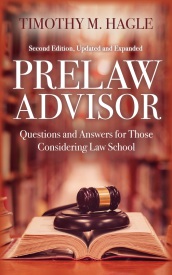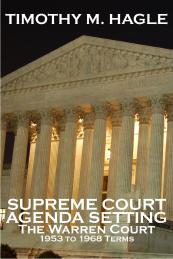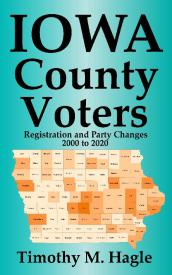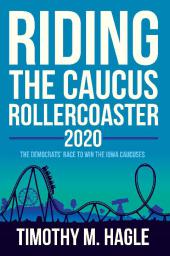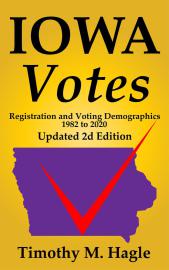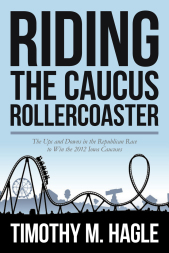
Contact Info
347 Schaeffer Hall
319-335-2348
timothy-hagle@uiowa.edu
Twitter: @ProfHagle
Fall 2024 Office Hours
Tue & Th: 4:45-6:15
Mailing Address
Dept of Political Science
341 Schaeffer Hall
20 E. Washington Street
The University of Iowa
Iowa City, Iowa 52242
News
Posted updated Prelaw FAQ for UI students
New Book, Riding the Caucus Rollercoaster 2024, published in paperback and for Kindle devices.
Posted updates to 12 papers in Iowa Voting Series for 2022 election data
New Book, Supreme Court Agenda Setting: The Warren Court, published for Kindle devices and computers with Kindle reader.
Published updated and expanded edition of Prelaw Advisor in paperback and for Kindle readers
My books
POLI:3101/30:116 American Constitutional Law and Politics
Miscellaneous Teaching Evaluations
This page contains comments I have received from former students (usually via email). The most recent comments are at the top, except for the very top one which is my all-time favorite. Any comments by me are in italics following the comment.
- I was one of your many Con Law undergrads a few years back. I hated your class with a passion. I hated our class and hated you. Too much of an edge or something . . . probably
too much reading and thinking required. But I've come around and really want you to know that, in retrospect, your class and teaching style were more useful to me than the standup
comedy/variety shows I so enjoyed at the time. I hope to God you are still hammering students with some form of the Socratic method. Yours was an uncomfortable classroom, and for that I
commend you. Keep up the thankless work.
This has got to be my favorite comment. I received it during the first week of a fall semester and promptly read it to my current class. It really hits on one of my goals for the course, namely, that students learn how to think about the material so it will be useful to them well beyond the course. It's not thankless, but a fair number of students do complain about either the Socratic method (a question and answer rather than lecture style), the fact I don't just spoon feed the material to them, or the difficulty of the tests. As this former students suggests, I could probably change the course so students would "enjoy" it more (i.e., make it easier), but I think that would be shortchanging them in the long run. A fair number of former students have told me similar things, so I must be on the right track.
- Dear Professor Hagle,
Hello, it's _______. I took your Constitutional Law class last spring. I just wanted to let you know how helpful your class has been to me as a history student teacher. Your class was undoubtedly the hardest I took at Iowa, with more homework than expected. However, the hundreds of pages of notes used for your exam have helped me write lesson plans and have provided an invaluable resource for understanding our government. I have read those notes again and again.
Please tell your students to KEEP the test study notes. They are invaluable....and so was your class.
Thanks so much,
I'm very happy this student is still finding my course useful. She had to work very hard to keep up with the material given that she had not had any other law-related courses before. Although most of the students who take this course (and my other ones) are mostly planning on law school, I tell students the first day of class that it is also valuable to those not planning on law school. I hadn't thought specifically about it in terms of teaching history or related courses in high school, but this course in particular provides students with an understanding of several "big name" Supreme Court cases that will be useful if, like this student, they later are in a position to explain them to others.
- Professor Hagle,
Not sure if you remember me, but I was a student in your Constitutional Law class, as well as a few of your other classes at Iowa.
I'm currently a first year law student in my second semester at Columbia Law School in New York, and I just wanted to write to tell you how helpful your classes were to me during my first year of law school. I was not always the most conscientious student in your classes, but the skills I picked up from them, and Con Law in particular, have given me a tremendous advantage in absorbing the necessary case material for final exams and in legal writing.
I hope you continue to do your students a service by writing difficult tests and grading papers with a strict attention to clarity and detail, even if they do not always appreciate it at the time.
So, thank you. Have a great spring semester.
I did remember this student and was very pleased he was off to a good start!
- Professor Hagle,
I took four of your courses in my last year at Iowa, and they were invaluable for my law school career. Within the first week of starting here at _____ Law School, I realized just how much of an edge your courses gave me over my peers. Really, it was apparent from one of the first days of orientation when we read Fraser and I got to show off a little by remembering some of the speech.
Moreover, at the beginning of the year, when the learning curve is most steep, I did not have to waste time learning the names of reporters or, and this was a huge advantage, learning how to read/brief a case. Thanks to your introduction to the Socratic method, I was not scared to be called on in class. I was able to respond under pressure and stay engaged with the discussion. Thanks in no small part to the knowledge gained from Research in Judicial Politics, I got my first law school A today (in Legal Research). Hopefully there is more to come. Additionally, my experience writing papers for your courses helped greatly with my Legal Writing class (A's on the first two papers, still waiting for the final). Finally, next semester I will be in Constitutional Law, and I know my experience in your class will come in handy.
As an aside, I am taking the GMAT tomorrow so I can pursue a JD/MBA joint degree. You should consider adding this test to your list of reasons to study math.
In sum, I just wanted to write this (I have been meaning to do this sooner) to tell you how grateful I am to have taken your courses and for the preparation they gave me for law school. I hope your school-year is going well!
This was from a student starting his second semester of law school. As he notes, he was in four courses of mine so I'm posting this for all four.
- Professor Hagle
I meant to email you earlier about how beneficial your classes were for my first year [of law school] so far. I was one of the few students who had briefed or even read cases prior to classes. Your warnings on the importance of writing we're well taken. I think the most important tool you told us about was the need to look up words because I have a contract professor who loves to call kids out for not looking up words like "indemnify" or "surety bonds". I really hope the administration relaxed its stance on your research class. That was hands down the class that prepared me the most by showing us how to research cases in the actual reporters; that makes citing in proper blue book form much easier.
Thanks again
This student was in several of my courses, but he mentions 30:116 and 30:106 so I'm posting it in both locations.
Yes, reading materials before class and looking up unfamiliar words is a much for law school. I try to get students to do it in this course to get them in the habit.
-
Professor Hagle,
I am writing you this email because I was a student in two of your classes at Iowa, Judicial Process and American Constitutional Law & Politics (2010-11), both of which I enjoyed immensely. It was actually the latter which sparked my interest in law school. Particularly, I enjoyed getting to analyze the jurisprudence of each Supreme Court justice, getting to know their politics, and predicting what side they would come down on.
Now, I am about to wrap up my second year of law school at DePaul, and I am applying to the Illinois bar. Constitutional law remains my favorite faucet of the law; last summer I worked for a professor doing research on the First Amendment and this year I wrote my law review article on the recent Supreme Court decision Hosanna-Tabor v. EEOC.
As part of my bar application, I need references from two undergraduate professors as educational references. I know that you might not remember me well enough to be a reference. I was a bit of a shy student in those days. But if you do, and are willing to assist me by being a reference, I would really appreciate that. I would just need your contact information (phone and address). Hope everything is well with you. Thanks,
I have a fair number of former students who need references for their application to take the bar in Illinois. Some other states require this too. It's another good reason to get to know some professors while an undergraduate. Fortunately, I keep pretty good records of my students so I'm able to at least comment enough for bar recommendations for even the "shy" students.
-
Prof. Hagle,
How are you? I hope you had a great holiday.
I just wanted to grant you a bit of a "I told you so" moment.
I am in Con Law now in my second semester of law school and … I LOVE IT. Please tell me why I never realized this before?? In round #1 or round #2…? Oh how I wish I would have worked harder. Hindsight…
Hope you are doing well. Still working with the CRs?
Heh, the subject line for this message was "Con Law love." Well, that hindsight thing catches a lot of us. This student was active in politics, so that took up a lot of her time. Still, she stayed with it and got the basics down so that she's able to do well with the law school version. I make a lot of movie references in class and this is a "Mr. Miyagi" moment where they realize that the things I had them do really had a purpose. "Wax on, wax off!" (If you don't get the reference go watch "The Karate Kid" (1984).)
- Professor Hagle,
In my course evaluations we did in class I indicated to you how between The Judicial Process and Con. Law, I learned more so than probably any other semester I have before here at Iowa. I also wanted to tell you just how much I enjoyed both of these classes and the impact they had on me. Despite the grades I may receive in both of these, the amount of knowledge and skills I walked away with is immeasurable. When I am with my friends at a study session or even just sitting around casually talking, I have become the go-to guy for all the legal/political questions (even if half the time I'm just acting like I know the answer). But that's because I've realized I love discussing law and politics, specifically Constitutional Law; it stimulates my critical analysis skills better than anything I've experienced before, and as a result I'm just a more critical and shrewd person. I would occasionally walk out of Con. Law mentally fatigued from all the questions you'd pose, and even if I didn't volunteer I would certainly be mulling the question over in my head. And the next day, I found myself better able to analyze a similar question.
I can't describe to you the uneasiness of not really knowing what you would like to do for the rest of your life, or at the very least study for the remainder of your college career, I don't doubt you experienced similar thoughts as an undergraduate, but the primary difference here is I was fortunate enough to have a professor like you to turn that all around. Now when I think back, I wonder how I wanted to do anything else other than be an attorney, or at the very least go to law school, and regardless of the hoops I'll probably have to jump through, I will see that happen.
When we spoke during your office hours I told you how my family, and pretty much everyone that I knew was strongly pushing me down the medical path. But, being a doctor or being in medical school (or expressing an interest in med school as an undergrad) is so commonplace and prevalent in my community and my family that I wanted to do something different. I've always encouraged myself to distinguish myself from my peers any chance I get and do my own thing, something I sincerely believe I would like to do. Now I know law school isn't exactly the most rare choice of study, but let me assure you where I come from it definitely is. It's even more encouraging because I feel as though I have a skill set or at least the basics down required to practice law: I enjoy writing, enjoy reading and analysis, and definitely enjoy a good debate. It seemed like something out of a nightmare to have to stand around in a lab coat mixing chemicals and looking at frog legs. And had I not signed up for these courses I may not have discovered these inclinations.
I am very interested in taking the two courses you've offered for next term. . . . I hope you found me to be a pleasant student to be around, and weren't too annoyed with all my questions or anything, and I can't wait to see what else you have in store!
Thanks again,
I appreciate this very thoughtful note. This student was my advisee as well as being in several of my courses and we spoke frequently about his plans and goals. I'm glad the courses, particularly Con Law, got him so interested in legal topics. He was a pleasant student who regularly asked good questions in class--something that's always appreciated!
-
Hi Professor Hagle,
We've got a 50 question multiple choice (open note) criminal law final tomorrow morning. It's my last final of the semester, and needless to say I can't wait for it to be over. Just wanted to drop another "Thank you", because I think I was more nervous for your Con. Law exams than I am for this one. I appreciate it now more than ever before, although I believe I was one who appreciated it at the time as well. Hope you've had a great semester, thanks again!
Another note from a student who had sent a few before commenting on how my courses had done well in preparing him for law school. I tell students that they won't see many multiple choice exams in law school, but this was one and having had my mc exams as an undergrad apparently allowed him to feel comfortable with this one.
-
Dear Professor Hagle,
How is life at Iowa? I hope you are doing well! I just wanted to update you on my progress through law school. First semester was a grueling experience. When people say "law school is tough", you really don't know until you're there. It has been one of the most intellectually stimulating experiences of my life. I managed to stay afloat of the work load, and at the end, Constitutional Law was my best grade! imagine that? I really think taking your course helped a lot! It just seemed to click much easier than the other classes even though the approach to the law was nothing like undergrad.
Anyways, this summer I will be interning with the New York State Attorney General, Civil Rights Bureau in Manhattan. I am really excited about that opportunity. I thank you for the support and how tough you were on us in con law, it helps in the end. (I am taking criminal law this semester, and taking your criminal justice system course is coming in handy too. We are studying felony murder right now).
Please continue to be tough on your students. It is in their best interest to learn how to work hard now because the learning curve in law school is very high and working hard is the only way to break the curve.
Take care.
This was another note from the student who sent the message three posts down.
-
Hi Professor Hagle,
Just another quick note from law school. We are spending a whole class today in my legal writing class talking about basic case citations. Even a semester into law school, people don't know what "P.2d" means in a citation. Luckily I was not among them. I know I've sent a few e-mails in the past thanking you for prepping me for law school, but I'm not sure I told you how much I appreciate the "little things" that I learned in your class. Being familiar with terms, citations, etc. from the beginning of law school has helped a tremendous amount. And a note to pass on to students: As I sit here in legal writing, I can "take the day off" because we're going over things I learned in undergrad. There are great benefits from taking your classes, in addition to the material we learned.
Thanks again!
This was another note from the student who had sent the long below. I'll also post this one in a couple of places.
-
Hi Professor Hagle,
I wrote to you during my first week of the semester and told you how your classes had given me a great head start in law school. After finishing the semester, I can honestly say that "Thank You" doesn't go far enough to show my appreciation for the things you do for future law students.
In my writing class, I felt (and the professor indicated) that my writing was right where it needed to be. More specifically, I was writing in concise terms and saying exactly what I needed to say without going any further. There were times in your classes where I thought, "Okay he's going a little overboard here" when you would talk to us about writing. I couldn't have been more wrong. If my professor wanted five pages, he wanted five pages loaded with material, and no fluff whatsoever. Exactly how you said it would be, of course!
Another part of the writing course (and other courses) that I thought you gave me a leg up in has to do with the length requirement. In my writing course, I could have written 15-20 good pages on each paper. Our papers were limited to 10 pages. In another course, our essay exam was subject to a strict length requirement. Talk about pressure! I spotted 5 issues on the exam that I couldn't even mention on the exam because of this length requirement. I know you take a bit of grief for your "10 pages maximum", no page range, etc. Once again, it's spot on with how law school is, and this was great preparation.
Although I never used the "drop first test score" option in your class, basing the majority of a student's grade on one exam is exactly how it is in law school. For my other three classes (besides writing), our entire grade was based on one three-hour exam per class. So, having an exam worth 70% of the grade really isn't that bad!
The next comment I have is in regards to feedback in your courses. I was one who strongly objected (although not to you) to the fact that you did not give a "class average" or any idea of how others in the class did on tests. Also, I did not like that you waited until the last day of the course to return papers. In the research class, I did not like that we had no certain grade, but only an idea of our progress. But, in my first semester of law school, I got absolutely NO feedback on how I was doing in the course, except for my first paper grade in my writing course. This is a very unsettling feeling, and although you do give some grades throughout the semester, your courses were the closest I came to this feeling during undergrad. In my opinion, the lack of feedback throughout the semester is by far the most difficult part of law school. Trying to gauge how you're doing in the course is impossible, and it can drive you crazy at times.
Here's one that your course does NOT do well. In all of my courses, we had set assignments each day! Okay, so maybe I'm still slightly bitter that on the day I was assigned to speak in Con Law I prepared 4 or 5 extra cases. But, I just had to throw that in there!
The last comment is much more general. The reading, the writing, the classroom atmosphere, etc. that you provide are great preparation for law school. Attention to detail is key, taking good notes is key, and being prepared for class on a daily basis is crucial. The reading is dense, I had to read things many times to understand it, and there is a ton of reading every night. Professors don't use powerpoint in law school, so taking notes without powerpoint is a great skill to learn.
Okay one more comment, sorry! I had some multiple choice tests during finals. I would say your exams were very representative of what I saw in law school. I'm sure every student dislikes the fact that your exams are very detail oriented, and that one word can completely change the answer. Well, if they're going to law school, they should get used to it.
Sorry for the lengthy e-mail, but I really felt that I needed to tell you how much of an advantage I felt that I had in my first semester of law school because of your classes. I enjoyed your classes a lot, and I appreciated your teaching style at the time. But, now more than ever, I feel lucky to have had a professor who is so committed to preparing students for law school. Thank you so much, happy holidays!This student sent me some prior comments when he started his first semester of law school. These apply to several of the courses he took with me as an undergrad that I'm going to post them to the comments for each course.
-
I am about to move to [New York] in a week and they have already assigned us reading/cases to brief before orientation. There were many students confused about how to brief a case and what to do, but I knew exactly how to approach these cases because of your Con Law class!!! I was really nervous about how I would do but I am feeling a bit more confident now because I feel like I at least know what I am doing.
Have a great rest of the summer and thank you for everything!!You're welcome! Aside from everything else, helping my students ease into law school is certainly one of the goals for my courses, particularly Con Law.
-
You probably don't remember me but I took Judicial Process and US Con Law with you in the last couple of years. Even though my degree is in Finance, the enjoyment I got from your Con Law class steered me towards law school next year instead. This fall I'm starting at DePaul Law with a scholarship. I think its good that you give students exposure to a Socratic environment, because some of us, myself included, found that they enjoy it. Further, I think that the experience I got from reading casebooks is going to give me a leg up and some extra confidence next year. Thanks for helping me find something that I think I like more than studying/practicing business.
-
I would like to thank you again for writing a recommendation for me for law school. I have decided to attend [a law school in New York] this fall unless, I get into Northwestern. I spoke with a couple admissions directors at some of the schools I visited and they commented that having Con Law on my transcript and discussing the class in my personal statement was something that stood out to them.
What's interesting here is how admissions directors took note of her mentioning my class in her personal statement.
- My name is [...]. I graduated from the University of Iowa in May 2010. I was an advisee and student of yours. I took American Constitutional Law and Politics (030:116), The
Judicial Process (030:153), and The Criminal Justice System (030:158). I'm now in my first semester at The John Marshall Law School in Chicago, Illinois.
As I conclude my tenth week in law school, I thought it would be an appropriate time to email you to share my law school experience thus far compared to my experience in your classes. I thought you might want to relay some of the information to your current students, if you feel it has any merit. (Most of the information draws on my experience in 030:116.)
1. 030:116 is as close to a real law school class as the University of Iowa offers. The socratic method you employ, as you note, is much less intense than at the law school level. What I mean by that is, at the law school level, classes are taught entirely using the socratic method. Students are expected to be fully prepared every class; students are randomly called on to stand up and answer a series of questions posed by the professor. Nothing less than exemplary answers are expected. This was even true on my first day of class: There was assigned reading and within the first two minutes, a student was randomly selected to present the facts, issue, holding, and reasoning of the case. (It is also important to effectively brief cases!)
2. The course text assigned in 030:116 is similar to a real law school text. All of my books are "case books" composed of various cases across many jurisdictions. The book you assign in 030:116 is very similar, and provides good practice for reading and understanding case law.
3. The reading assignments in 030:116 are similar in length to real law school assignments. Law school assignments do not appear daunting, because only 20-30 pages are assigned per class session. The difficult part, of course, is fully understanding every word within the assigned reading. This is a point you stress very well.
4. Writing is paramount to law school success. In my opinion, this is what you convey best. At the time I took 030:116 I was not interested in modifying my writing style to fit your guidelines. Legal writing is so different than the writing style expected in a rhetoric class, for example. I would recommend to your current students that they put forth as much effort on your writing assignments while they are still in college, because once they get to law school, they will have a distinct advantage over other entering first-year law students.
5. The exams given in 030:116, 030:153, and 030:158 are not unlike those given in law school. I just had a Contracts I midterm exam a few weeks ago. It was fifteen multiple choice questions. The questions were not unlike your test questions: Detail-oriented to truly test a student's depth of understanding of a subject matter. In college, I brushed your test questions off as "unnecessarily tricky" and "intentionally deceiving," but I'm honestly a better law student because of it. While it is true that the majority of law school classes only have one exam at the end of the semester, it is also true that some classes--like my Contracts I class--have midterm exams and use multiple choice questions.
In sum, Professor Hagle, I would like you to know that you do an outstanding job preparing students for law school. You are an excellent professor, and your dedication too often goes unappreciated. Thank you.
Thank you!
- I just wanted to let you know that your Constitutional Law and Judicial Research classes have really helped me in my first weeks of law school. I think your courses gave me an edge in
reading and briefing cases, and your soft Socratic method was a nice prep for law school. Have you considered employing a full Socratic method for Con Law?
That edge during the first weeks of law school is one of the things I shoot for in my classes. Many students are really lost the first couple of weeks because they may not know how to read a court opinion or know much of the legal lingo or where to find information, etc. Knowing some of these things beforehand helps to lessen the difficulty of the initial law school experience. As for the Socratic method (which emphasizes question-and-answer in the classroom rather than lecture), it's sufficiently different from what most undergrads have had in other classes that I wouldn't want to use it exclusively.
- I just wanted to drop you a line and say thanks for all of your great teaching I benefited from. I was sitting in my criminal law class . . . yesterday and my professor kept teaching things I
already know, thanks to you. And he even used a couple of the same examples you did. All of your classes have given me what I think is a huge advantage in my first year, and I wanted to say thank
you! (8/22/02)
This student had been in both 30:116 and 30:158.
-
Hello Professor Hagle, how are you? I hear that you are not teaching this semester. What will those poor students do???? Are you in Washington? How is the research going? Anyways, I don't want to bother you but I thought I would drop you a quick note to let you know that today is my third day of law school and wow. Who knew it would be this rigorous. I didn't think I would be one of these people but I have to tell you, your classes have really proven to be a lifesaver. It is funny because when you were telling us that people write back and tell you how much your class helped I remembered thinking, yeah right they are just suck ups! :) But actually, they do. My legal research class, however, is really boring because I already know how to look stuff up on lexis and how to look stuff up in the reporters. I find that I am mainly helping my classmates figure it out. I was the first one done with the assignment and my teacher was impressed. Also, reading the cases for class is still tough, but I could not imagine doing it without having had constitutional law. I kept all my materials from those classes and I have already used them, especially from the research class. That little course pack you made us with the reporters and such are very helpful! Anyways, thank you again and I hope to keep in touch and I hope you get back to the University soon because no other teacher (a conservative teacher even!!) has taught me so much!!!!
Thanks again and good luck,
